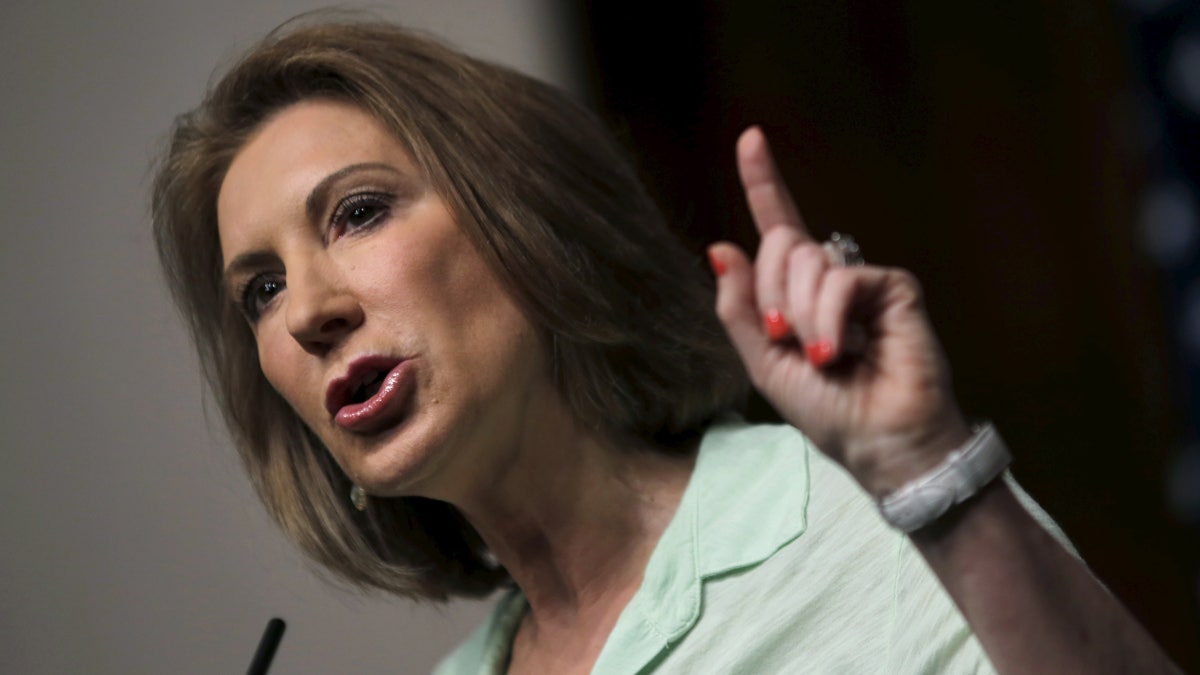
U.S. Republican presidential candidate Carly Fiorina addresses the "Road to Majority" conference in Washington June 20, 2015. (REUTERS/Carlos Barria)
Technically, Carly Fiorina is seven years younger than Hillary Clinton. Technologically, Fiorina's supporters say, they are a century apart.
Fiorina, the former CEO of Hewlett Packard, hopes her Silicon Valley background will make her stand out among the ever-growing list of Republican presidential candidates, and that her 21st century technology chops will make her the logical choice in a one-on-one matchup against Clinton next year.
"Carly Fiorina brings with her to this contest a series of secret weapons that, if ever given an opportunity to be operationalized, could make her candidacy very compelling,” said Tony Sayegh, a Republican campaign strategist and Fox News contributor who is not aligned with any candidate.
“For example, her understanding of technology, as a matter of public policy, national security and campaign tactics, is arguably greater than any other candidate in the race. She makes Hillary Clinton appear particularly inept and ill-prepared when you consider that even the most generous interpretation of the Clinton defense in ‘Servergate’ is that Hillary is ‘behind the times’ when it comes to technology.”
Fiorina, 60, is widely considered a long shot in the GOP race. But she broke into the top 10 Republican candidates in a Quinnipiac University poll late last month, and she’ll participate in the early primary debates if she can stay there.
Whether voters will warm to a candidate who has no legislative experience and has never won an election remains to be seen, but Fiorina’s supporters believe she can use her understanding of the tech industry to reimagine government and engage those who feel disconnected. They believe her understanding of how the tech sector affects the U.S. economy will help innovation flourish, which could be crucial for the next president of the United States.
“Carly Fiorina understands the issues facing employees in the technology industry as well as any candidate running,” says GOPAC Chairman David Avella, who is not aligned with any candidate. “By bringing these issues and her ideas to the table, she helps herself and Republicans as a whole as we work to earn the votes of tech employees and younger voters."
The political stakes of cyberwar and espionage, ISIS and Chinese hacking, flash trading and hate speech online have magnified during the Obama presidency, and there is no reason to think they won’t continue to rise as technology advances. Add the importance of technology to economic growth, and it’s easy to see why a candidate who has limited computer skills and business experience could be a liability for either party, the Fiorina camp says.
“Carly can effectively argue that we can't afford to have the commander-in-chief need on-the-job training when it comes to dealing with 21st century issues, cyberwarfare primary among them,” Sayegh says. “If Hillary Clinton admittedly can't even manage two email accounts, how can we expect her to lead us into the brave new world presented by advancing technology?”
Fiorina’s critics, on the other hand, are quick to point out that she may have an advantage in understanding technology, but her record at Hewlett-Packard was far from stellar. Early in her six-year tenure, HP merged with rival computer manufacturer Compaq and laid off 30,000 American workers. Fiorina was forced to resign in 2005 after HP stock fell 53 percent.
Eric Schiffer, CEO of ReputationManagementConsultants.com, says the layoffs and botched merger will haunt Fiorina, and that she will be shredded by the Clinton political machine.
“Fiorina used Sherlock Holmes-like tech marketing research at HP,” Schiffer says. “This ear-to-the-ground excising of consumer talking points helps connect her with voters by feeding them what they want, but her reputation as CEO was a disaster – and this will shove her over the Republican plank.”
And Eliana Johnson, Washington Editor of “National Review,” says Fiorina’s technology expertise may not be as critical as her supporters think. A presidential candidate doesn’t need to be a “subject-matter expert in technology,” Johnson says. A candidate needs only to “know that this is an issue of critical importance, which means surrounding him or herself with the best experts on the subject so that he or she can make well-informed decisions.”
But many Fiorina supporters believe technology expertise is, in fact, critical. “Technology is tied to everything we do,” says Republican strategist Jessica Proud, pointing to its huge impact on the world’s economy and “how we fight our wars and the emerging threats of cyberterrorism.” She says Americans “require a President with an understanding of how technology works.”
Prior to joining HP, Fiorina spent almost 20 years at AT&T and Lucent, and led the latter’s spinoff from AT&T in 1995. During her time at AT&T, she was responsible for the telecom giant’s hardware and systems division. At Lucent, she became group president of the company’s global service provider business.
Whether Fiorina wins the GOP nomination or not, her run raises an interesting point: Would a background in technology provide a decisive advantage for the leader of the free world? Her supporters say yes, and American voters will soon have their say.








































